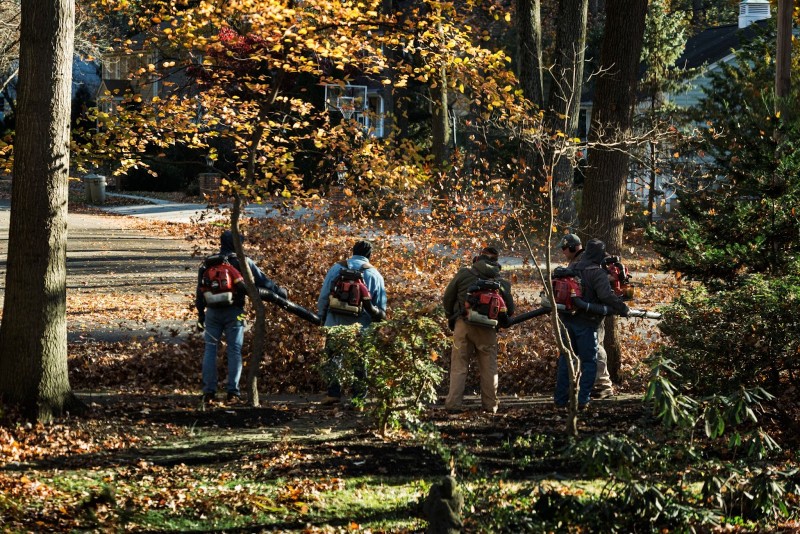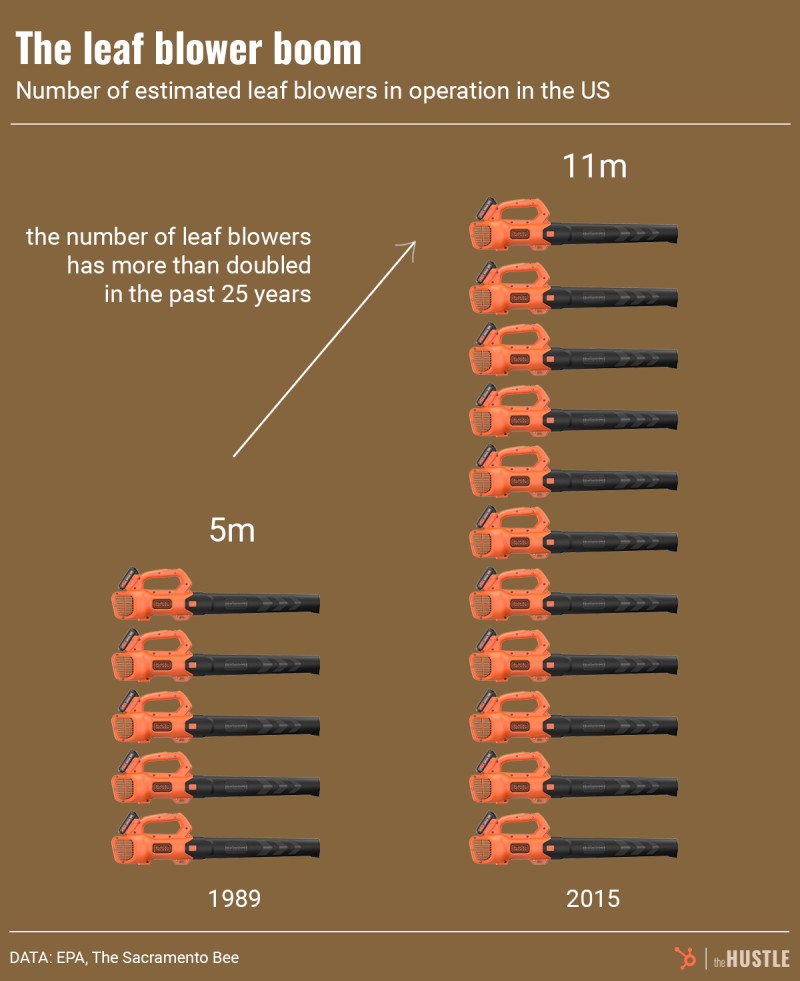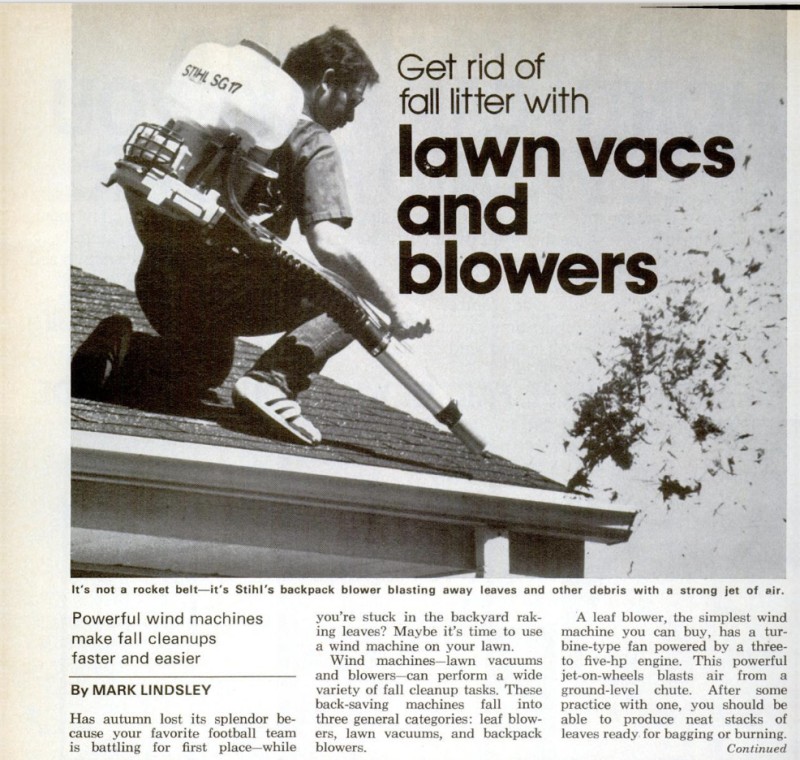We hate how leaf blowers sound. We love how they make our lawns look.
In Montclair, New Jersey, the leaves are falling.
They’re falling off oak trees that tower above Tudor-style mansions. They’re falling from sugar maples that line the city’s cozy streets.
Most years in the upscale bedroom community outside New York City, the picturesque season also brings with it a distinct, ear-splitting sound: the gas-powered leaf blower. Not anymore.
Last month, a ban on gas-powered leaf blowers went into effect in Montclair. The city, citing a desire to reduce pollution and noise disturbances, joined more than 150 municipalities that have enacted similar bans.
From small West Coast cities like Carmel-by-the-Sea, California, to East Coast metros like Washington, DC, a consensus has formed: Leaf blowers are dangerously loud and unhealthy, and life is more peaceful without them.

A work crew blowing leaves in New Jersey. (John Greim/LightRocket via Getty Images)
But fall in Montclair, although largely devoid of the gas-powered leaf blower’s piercing hum, hasn’t exactly been quiet.
More than a dozen landscapers filed a lawsuit against the city, seeking an injunction of the leaf blower ban. (A judge ruled against them.) Similar resistance has unfolded across the US, including a preemptive law passed by the Georgia legislature that basically prohibits cities in the state from banning gas leaf blowers.
Leaf blowers, despite being an environmental menace, are built into the business model of thousands of landscaping companies and into the expectations of millions of discerning Americans.
Some 40% of US residents with lawns pay for landscaping, and, as Richard Goldstein, owner of New Jersey’s Green Meadows Landscaping, says, “they don’t want to see leaves.”
The blessing and bane of suburbia
After the leaf blower hit the market in the 1960s and 1970s, homeowners and landscapers considered it a saving grace.
Popular Science described the tool as a “powerful jet on wheels.” The maintenance crew at Williams College in Massachusetts claimed blowers instantly cut leaf pickup time on campus by more than half. Californians noted that leaf blowers, used as an alternative to washing down sidewalks and driveways, saved untold gallons of water.
By 1990, the Portable Power Equipment Manufacturers Association estimated some 5m leaf blowers were operating in the US, 75% of them by non-landscapers, with ~850k blowers sold in 1989 alone. In 2015, ~11m were in operation, according to the EPA, including the popular backpack leaf blower, featuring a two-cycle engine, and the four-cycle walk-behind leaf blower, a larger model used primarily by landscapers.

The Hustle
Despite their popularity, leaf blowers have long inspired controversy. Carmel, California, banned gas-powered blowers in the mid-1970s, and cities like Beverly Hills, Laguna Beach, and Belvedere followed over the next couple decades, until, by 2000, some 20 California cities had enacted bans.
The arguments against blowers then, as now, are straightforward:
- Their exhaust is bad for the environment and worker health: In 2011, the automotive company Edmunds found a gas-powered backpack leaf blower emitted more toxins in 30 minutes than a Ford F-150 did on a drive from Texas to Alaska. (A more conservative estimate from the California Air Resources Board says a gas-powered backpack leaf blower produces the same amount of harmful emissions in an hour as driving a car for 1.1k miles.)
- They’re really loud: Blower operators have recorded decibel levels as high as 100 dBA, and 83 dBA for passersby within 50 feet. (Upon landing, noise levels in an airplane cabin are ~75-80 dBA.)
Worse, leaf blower sound is low frequency, which means it penetrates walls.
“One of the problems is that you can’t really get away from the sound,” says Jamie Banks, president of Quiet Communities and chair of the Noise & Health Committee at the American Health Association. “You go in your home and close your doors and windows, you hear it come right through.”
On top of being annoying, these noises can cause hearing loss and produce stress hormones that damage blood vessels and lead to cardiovascular disease. In terms of economic health, a study by University of Michigan public health professors estimated productivity losses and health care costs from excessive noise in the US at $3.9B annually.
There is an alternative to the noise and emissions: the electric leaf blower, powered by battery or plugged directly into an outlet. These blowers are typically higher-pitched and thus seem quieter than their obnoxious, gas-powered cousins.
A decent electric blower with a battery can cost more than 2x as much as a gas-powered model. (Landscapers must also pay for multiple batteries and charging infrastructure because leaf blowers can deplete a battery in just 30 minutes.) But they can be less expensive in the long run, requiring no gasoline costs and less maintenance.

Popular Science October 1977 (via Google Books and Popular Science)
https://thehustle.co/leaf-blowers-are-a-scourge-why-is-it-hard-to-get-rid-of-them




